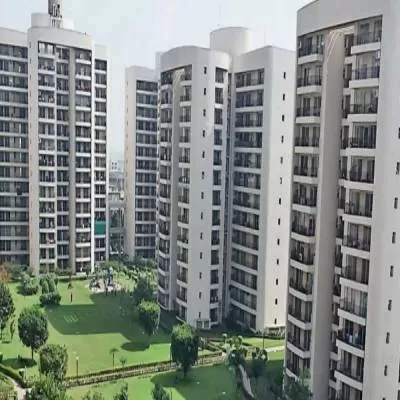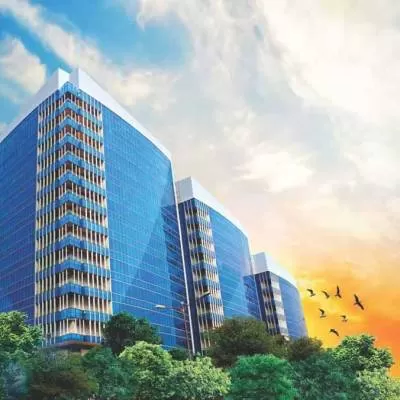- Home
- Real Estate
- In FM Mode

In FM Mode
Professionalised services in facility management (FM) for the commercial, hospitality, retail, industrial and residential sectors are the need of the hour. FM´s core role is to provide a seamless experience for employees, customers and stakeholders. ´While housekeeping, security and technical form the basis of this, verticals such as retail benefit from specialised services such as food court management, parking, leasing, marketing, CRM, horticulture management provided by the same group for maximising impact and longevity of the asset it manages,´ shares Vipin Chopra, COO-Management Services (Facility Management), Alpha Corp, which undertakes in-house FM services for its projects through Alpha Management.
Further, FM not only ensures uninterrupted operation of vital services but yields long-term cost benefits to property owners. FM software and solutions help optimise the use of resources and assets, leading to reduced operational costs and enhanced effectiveness.
The booming market
The organised FM services industry is pegged at around $7.6 billion, and has grown at 15-20 per cent over the past few years. ´For the foreseeable future, we expect the market to continue to grow at this rate, shares Sandeep Sethi, Managing Director-Integrated Facilities Management, JLL (West Asia). By 2020, the sector is expected to cross $19.4 billion.
Indeed, FM has witnessed growth in India over the past 10 years with more professionals joining the stream. Estimating the current market size in India at close to Rs 10,000 crore, Vijay Shankar Dwivedi, Head-Facility Management, Ambuja Neotia Group, adds, ´This is expected to grow at a CAGR of 30 per cent over the next five years.´
Demand drivers
Increased adoption of FM services has been a result of growth in sectors such as retail, hospitality, industrial and healthcare. However, ´traditionally, it has been IT and ITeS with Banking, Financial services and Insurance (BFSI) that drive demand,´ shares Sethi. ´Of late, manufacturing, educational and hospitality sectors are looking at outsourcing as well.´ In retail, shopping malls have been outsourcing FM services. Agreeing that it is predominantly in the IT and ITeS sectors and Tier-I cities where demand is substantial, Rajesh Pandit, Managing Director-Global Workplace Solutions, CBRE South Asia, says, ´As the large unorganised sector comprises the bulk of service providers, the margins in this business are low.´
However, Chopra says, ´Residential is driving maximum demand, followed by commercial and retail; industrial is a fast-emerging sector.´ He shares that in the residential segment, residential welfare associations (RWAs) are realising the importance of FM in ensuring cost-efficiencies, property valuations and community living.´Residents are expecting professionalism, from technical management, parking and horticulture to kids´ play areas.´ Sethi, too, believes this, but in the case of the high-end residential category.
All considered, the demand for FM services may vary. ´While IT and ITeS companies comply with quality, safety, environmental regulations, and labour laws; educational institutions would opt for cost and students´ safety,´ Sethi points out. This definitely creates the opportunity to develop different FM solutions for different sectors.
Outsourcing and in-house benefits
FM services can be outsourced or undertaken in-house (see box). Both have their own benefits.
Although tasks under FM can be accomplished by in-house staff, it is more advantageous to outsource them, suggests Sanjay Dutt, Managing Director, Cushman & Wakefield. He outlines why: Outsourcing can help reduce overall building maintenance costs in the long run. It allows more time to focus on the client´s essential core business aspects. Also, good FM companies give every project due importance to ensure quality, and are equipped with the latest technology and innovations.
Meanwhile, Ambuja Neotia Group outsources and undertakes FM services in-house for their projects. Dwivedi shares key benefits: Minimising operational cost; augmenting skills and potentials of in-house employees; effective coordination with the construction team to manage the premises better and focus on core expertise; improve business flexibility irrespective of location, improve productivity by adopting standard operating procedures; improve customer satisfaction; and being cost-competitive with financial savings without compromising on services.
Tech FM
Technology is gaining big traction in FM. Software governs business productively and helps exercise centralised control by generating suitable reports pertaining to accounts, MIS, maintenance schedules, orders, and keeping a tab on budget vs actual expenditure. ´Companies like ours have switched to SAP,´ says Dwivedi. ´There are many developments aimed at improving operational efficiency, minimising costs, maximising revenue and exercising control, be it automated systems and processes, upgraded equipment, energy-efficient devices, mechanised tools and gadgets, and products promoting sustainability.´
Also, compared to manual operations, FM software has many advantages. Manu R Nair, Senior Deputy General Manager-Facility, Orion Mall of Brigade Group, shares them: Presenting real-time data; no manual error while monitoring or recording; easy statistical analysis from data bank; planning and scheduling activities; and optimising resource utilisation by real-time monitoring or controlling.
Further, Sethi says,´The first investment we make when we take over facilities is to bring in technologies to capture expenses efficiently, allowing clients to build a baseline. At the operating level, we bring in technology to effectively manage operations. These are computerised maintenance management tools or platforms that keep track of all assets; in a building, for instance, they show how much is spent on each aspect of repairs. We also have applications and tools to track, manage and save energy more efficiently. And, from a compliance perspective, we bring in technology to manage risks and ensure security and safety.´
That said, despite the many benefits, Pandit sees low market penetration. ´Most occupiers use basic ERP systems for financial and purchase functions. In cases where computer-aided facility management (CAFM) software is used, key areas typically include maintenance, asset and compliance management, inventory modules, and purchase-to-procure systems.´
Energy-conserving devices
As 60 per cent of cost is incurred in electricity, of which two-third is HVAC, Dwivedi states, ´Energy-saving devices play a key role in reducing cost. Similarly, utilising technologies to treat water, including rainwater harvesting, reduces the cost of availing tHUDA, DHBVNL, HSPCB, MCG,he resources.´
Energy-conserving devices include a variety of technologies such as LEDs, VFDs, VRFs, automation in pumping, lights motors, STPs and RWHs. ´These not only ensure cost saving but provide environmental safeguards, minimum wastage and maximum output across all functions,´ says Chopra.
New technologies have increased the operational performance of high-energy consuming equipment. ´´Such devices have to be selected carefully as many do not work as per requirements; the in-house FM team should suggest customisation,´ avers Nair. He adds that equipment will render high performance when maintenance is carried out as suggested by OEMs.
Maintenance of electrical fittings
Standard HVAC systems of buildings generally use upwards of 40-50 per cent of the facility´s energy. Lighting systems contribute to 8-10 per cent of total power consumption. Pandit elaborates, ´High-efficiency HVAC systems and the latest lighting systems enable occupiers to reduce overall energy usage; hence, they have a significant impact on operating costs.´
Nowadays, one can actually build in a system to automatically carry out analysis, pointing out the trends within a building. And, for HVAC, lighting, etc, there are sophisticated BMS. Sethi explains, ´We bring in people with relevant skills to manage electrical and plumbing systems. So, we have regular maintenance management routines; predictive tests are done for electrical or vibration analysis for AC systems, etc. Hence, we detect a problem even before it exists.´
Electrical fittings such as AC, lighting systems, plumbing and security are contracted through annual maintenance contracts (AMCs). ´While AMCs focus on ensuring preventive maintenance and increasing the life of assets, plumbing and others ensure proper maintenance of public health engineering (PHE) facilities. Similarly, a robust security system ensures safety of customers and the premises,´ says Dwivedi.
The cost-effective way
By hiring expertise and being cost-competitive, one can minimise cost of operation while protecting assets and building in-house skills. There are various models in the industry that could range from cost plus margin to management fee structure, etc. Dwivedi shares,´While a commercial space can be maintained between Rs 10 and Rs 30 per sq ft, depending on location, retail development could cost between Rs 15 and Rs 50 per sq ft.´
Top management of companies have realised the value in opting for FM services. ´The scope of savings is 15-25 per cent over five years. And, if you include energy, savings are about an additional 10 per cent,´ shares Sethi. And, Pandit notes that outsourced service providers bring long-term value, reducing overheads and lowering costs through higher efficiencies and productivity. ´Savings to the tune of 8-15 per cent of operating budgets can be achieved,´ he says.
While undertaking in-house services, Nair notes, ´A good FM team can save as much as 10-15 per cent of operational cost besides improving the life of the facility.´ For instance, the HVAC chillers in one of Alpha Management´s commercial centres are over 16 years old. However, owing to maintenance and service, they continue to operate at 100 per cent efficiency and workability to date. ´Over the years, not more than Rs 1 lakh has been spent on total repair and breakdown,´ shares Chopra. The scope of cost-efficiency can be increased through innovative ways û buying leverage, new technologies and models, process re-engineering. Take, for example, what JLL does. Sethi shares, ´There are always new technologies and models, like in transport, where we offer a shared model, which brings big savings along with security features including camera and panic buttons, Wi-Fi in buses, snacks, etc.´
The road ahead
Earlier, five-star hotels and manufacturing plants did not prefer to outsource. But now, as Sethi says, ´Manufacturing plants are realising that outsourcing to experts uses less resources and is more cost-efficient while they can focus on business growth. The importance of cost-efficiency has impelled second-tier hotels and retail malls, too, to start outsourcing.´
That said, one of the biggest challenges the FM industry faces is lack of skilled and trained manpower, which is critical to performance. Another challenge is lack of awareness on the need for quality FM. Other concerns are high attrition rates, low margins and low entry barriers and cost pressures on margins owing to lower growth in the market.
Further, as the business is largely unorganised, players offering few services don´t meet demand.
While few institutions promote or offer FM courses, the Indian Facilities Management Association (IFMA) exists to guide and develop these practices (see box).
JLL, too, has partnered with educational institutions to offer curricula and certification programmes. Indeed, with burgeoning demand, it´s time for FM in India to migrate to the next level.
Quick Bytes
FM industry pegged at around $7.6 billion, expected to cross $19.4 billion by 2020. Demand drivers: IT and ITes, BFSI, retail, residential, commercial, hospitality, industrial, manufacturing, and healthcare.
Scope of savings: 15-25 per cent over five years.
FM software gaining traction for increasing operational performance.
Need of the hour: Skilled and trained manpower.
FACILITY MANAGEMENT
- Electromechanical services
- Power supply and distribution
- Diesel generators
- Water treatment plant
- Sewage treatment plant
- Fire-fighting systems
- Management of AMCs
- Procurement and stores management
- Energy management
- Compliance management
- Soft services
- Housekeeping
- Horticulture maintenance
- Pest-control management
Club services
- Health club and gym equipment
- Swimming pools
- Sports facilities and children´s play area
- Event management and festival celebration
Security services
- Guarding
- Parking management
- Traffic management
- Access control
- Management of domestic help and drivers
Financial management
- Billing, collection and payments
- Budgeting and cost control with periodic reviews
- Accounting and audit
Liaison with government or local authorities
Renewal of NOCs or licenses
Statutory compliances
Liaison with agencies like HUDA, DHBVNL, HSPCB, MCG, etc, for smooth running of complex
Outsourced or in-house?
While outsourcing FM services is believed to be more cost-efficient, undertaking these services in-house has its benefits too. Experts share more on their gamut of offerings...
The FM specialists
JLL offers services in four categories, as Sandeep Sethi, Managing Director-Integrated Facilities Management, JLL (West Asia), explains: 1) Engineering services - managing air-conditioning, electrical, plumbing, elevators, UPS, power backup generators, lighting; 2) Soft services or flight-based services - housekeeping, security, gardening, pest control; 3) Employee experience services - reception, transport, cafeteria, mail room management, events; 4) Workplace services - minor projects like fit-outs or renovations, moves or space planning, etc. Delivery across these categories involves prerequisites like technology along with a focus on compliance.
CBRE offers a full range of integrated FM services. ´These cover the entire gamut of engineering services, soft services, vendor management, property management, procurement services for facility management, budget planning and oversight, among others,´ shares Rajesh Pandit, Managing Director-Global Workplace Solutions, CBRE South Asia.
According to Sanjay Dutt, Managing Director, Cushman & Wakefield, the company offers the following services: Operational and critical equipment management; energy and sustainability programmes; budget support services; budget and finance management; process and transition management; supply chain management; space planning and occupant services management; lease administration; quality, benchmarking and audit services.
In-house FM experts
Brigade Group´s Orion Mall was able to track performance from the first day of operations, says Manu R Nair, Senior Deputy General Manager-Facility, Orion Mall. He shares the advantages: Life-cycle analysis of utility equipment monitored real-time; AMCs or CAMCs perform with high efficiency; ability to achieve >99 per cent uptime of critical equipment; high operational efficiency through monitoring of equipment performance parameters; high energy-efficiency with greener technologies; better customer satisfaction by monitoring performance through surveys; timely monitoring of building upkeep; 24 + 7 operational team to monitor building operation and ensure safety and security.
With developer Alpha Corp having services in-house, Vipin Chopra, COO-Management Services (Facility Management), Alpha Corp, shares, ´Services provided for any facility are customised to requirements. Hence, we have segmented specialised services into facility management and mall management.´ Having FM services in-house itself, ´The prime benefit is being able to give any building or infrastructure a sense of timelessness, a longer life. Flawless coordination between the building and maintenance team - overall better control, in-house technical solutions, long-term maintenance - all help control costs while maximising property value and escalations in future,´ adds Chopra.
Advancing FM
International Facility Management Association (IFMA) is a worldwide recognised association for facility management (FM) professionals. In India, IFMA focuses on advancing the FM profession through education, credentialing, government relations, professional development and leadership opportunities, research and standards development. With this, the association assists facility managers in developing strategies to manage human, technology and real estate resources. Maheshwaran V, Director, IFMA India, shares: ´Our core intent is education - to train and certify people in FM. One of the most important function in any building is facilities management, and qualified people with domain knowledge are required to handle these more efficiently. As an association, we support FM professionals in learning and understanding the best practices in FM and to adopt these practices. Further, we advocate global FM practices and make our members aware about what is available globally. Our programmes are not restricted to a particular region; we offer global certifications with which one can seek opportunities within the country and globally. Additionally, we create awareness about local regulations to ensure that the person handling facilities is aware about local laws and compliances and implements these practices. IFMA´s global job task analysis, a survey conducted to understand job functions of facility managers in various regions, has helped in understanding region specific needs and cater to specific educational needs in those regions.´
"The first investment we make is to bring in technologies to capture expenses efficiently.´
- Sandeep Sethi, Managing Director-Integrated Facilities Management, JLL (West Asia)
"Outsourcing can help reduce overall building maintenance costs in the long run.´
- Sanjay Dutt, Managing Director, Cushman & Wakefield
"Savings to the tune of 8-15 per cent of operating budgets can be achieved.´
- Rajesh Pandit, Managing Director-Global Workplace Solutions, CBRE South Asia
"Industrial is a fast-emerging sector for FM.´
- Vipin Chopra, COO-Management Services (Facility Management), Alpha Corp
"Companies like ours have switched to SAP.´
- Vijay Shankar Dwivedi, Head-Facility Management, Ambuja Neotia Group
"Equipment will render high performance when maintenance is carried out as suggested by OEMs.´
- Manu R Nair, Senior Deputy General Manager-Facility, Orion Mall
- Seraphina D´souza
To share your views on this article, write in at feedback@constructionworld.in
- Professionalised services
- FM services
- Commercial
- Hospitality
- Retail
- Industrial
- Vipin Chopra
- Alpha Corp
- Sandeep Sethi
- JLL
- Vijay Shankar Dwivedi
- Ambuja Neotia Group
- CAGR
- BFSI
- Rajesh Pandit
- CBRE South Asia
- RWA
- Sanjay Dutt
- Ambuja Neotia Group
- Cushman & Wakefield
- Manu R Nair
- Orion Mall of Brigade Group,CAFM
- HVAC
- LEDs
- VFDs
- VRFs
- Automation
- Pumping
- Lights motors
- STP
- OEM
- AM
With increased need for effective facilities services and cost-effectiveness, the facility management (FM) industry is set to grow exponentially. Professionalised services in facility management (FM) for the commercial, hospitality, retail, industrial and residential sectors are the need of the hour. FM´s core role is to provide a seamless experience for employees, customers and stakeholders. ´While housekeeping, security and technical form the basis of this, verticals such as retail benefit from specialised services such as food court management, parking, leasing, marketing, CRM, horticulture management provided by the same group for maximising impact and longevity of the asset it manages,´ shares Vipin Chopra, COO-Management Services (Facility Management), Alpha Corp, which undertakes in-house FM services for its projects through Alpha Management. Further, FM not only ensures uninterrupted operation of vital services but yields long-term cost benefits to property owners. FM software and solutions help optimise the use of resources and assets, leading to reduced operational costs and enhanced effectiveness. The booming market The organised FM services industry is pegged at around $7.6 billion, and has grown at 15-20 per cent over the past few years. ´For the foreseeable future, we expect the market to continue to grow at this rate, shares Sandeep Sethi, Managing Director-Integrated Facilities Management, JLL (West Asia). By 2020, the sector is expected to cross $19.4 billion. Indeed, FM has witnessed growth in India over the past 10 years with more professionals joining the stream. Estimating the current market size in India at close to Rs 10,000 crore, Vijay Shankar Dwivedi, Head-Facility Management, Ambuja Neotia Group, adds, ´This is expected to grow at a CAGR of 30 per cent over the next five years.´ Demand drivers Increased adoption of FM services has been a result of growth in sectors such as retail, hospitality, industrial and healthcare. However, ´traditionally, it has been IT and ITeS with Banking, Financial services and Insurance (BFSI) that drive demand,´ shares Sethi. ´Of late, manufacturing, educational and hospitality sectors are looking at outsourcing as well.´ In retail, shopping malls have been outsourcing FM services. Agreeing that it is predominantly in the IT and ITeS sectors and Tier-I cities where demand is substantial, Rajesh Pandit, Managing Director-Global Workplace Solutions, CBRE South Asia, says, ´As the large unorganised sector comprises the bulk of service providers, the margins in this business are low.´ However, Chopra says, ´Residential is driving maximum demand, followed by commercial and retail; industrial is a fast-emerging sector.´ He shares that in the residential segment, residential welfare associations (RWAs) are realising the importance of FM in ensuring cost-efficiencies, property valuations and community living.´Residents are expecting professionalism, from technical management, parking and horticulture to kids´ play areas.´ Sethi, too, believes this, but in the case of the high-end residential category. All considered, the demand for FM services may vary. ´While IT and ITeS companies comply with quality, safety, environmental regulations, and labour laws; educational institutions would opt for cost and students´ safety,´ Sethi points out. This definitely creates the opportunity to develop different FM solutions for different sectors. Outsourcing and in-house benefits FM services can be outsourced or undertaken in-house (see box). Both have their own benefits. Although tasks under FM can be accomplished by in-house staff, it is more advantageous to outsource them, suggests Sanjay Dutt, Managing Director, Cushman & Wakefield. He outlines why: Outsourcing can help reduce overall building maintenance costs in the long run. It allows more time to focus on the client´s essential core business aspects. Also, good FM companies give every project due importance to ensure quality, and are equipped with the latest technology and innovations. Meanwhile, Ambuja Neotia Group outsources and undertakes FM services in-house for their projects. Dwivedi shares key benefits: Minimising operational cost; augmenting skills and potentials of in-house employees; effective coordination with the construction team to manage the premises better and focus on core expertise; improve business flexibility irrespective of location, improve productivity by adopting standard operating procedures; improve customer satisfaction; and being cost-competitive with financial savings without compromising on services. Tech FM Technology is gaining big traction in FM. Software governs business productively and helps exercise centralised control by generating suitable reports pertaining to accounts, MIS, maintenance schedules, orders, and keeping a tab on budget vs actual expenditure. ´Companies like ours have switched to SAP,´ says Dwivedi. ´There are many developments aimed at improving operational efficiency, minimising costs, maximising revenue and exercising control, be it automated systems and processes, upgraded equipment, energy-efficient devices, mechanised tools and gadgets, and products promoting sustainability.´ Also, compared to manual operations, FM software has many advantages. Manu R Nair, Senior Deputy General Manager-Facility, Orion Mall of Brigade Group, shares them: Presenting real-time data; no manual error while monitoring or recording; easy statistical analysis from data bank; planning and scheduling activities; and optimising resource utilisation by real-time monitoring or controlling. Further, Sethi says,´The first investment we make when we take over facilities is to bring in technologies to capture expenses efficiently, allowing clients to build a baseline. At the operating level, we bring in technology to effectively manage operations. These are computerised maintenance management tools or platforms that keep track of all assets; in a building, for instance, they show how much is spent on each aspect of repairs. We also have applications and tools to track, manage and save energy more efficiently. And, from a compliance perspective, we bring in technology to manage risks and ensure security and safety.´ That said, despite the many benefits, Pandit sees low market penetration. ´Most occupiers use basic ERP systems for financial and purchase functions. In cases where computer-aided facility management (CAFM) software is used, key areas typically include maintenance, asset and compliance management, inventory modules, and purchase-to-procure systems.´ Energy-conserving devices As 60 per cent of cost is incurred in electricity, of which two-third is HVAC, Dwivedi states, ´Energy-saving devices play a key role in reducing cost. Similarly, utilising technologies to treat water, including rainwater harvesting, reduces the cost of availing tHUDA, DHBVNL, HSPCB, MCG,he resources.´ Energy-conserving devices include a variety of technologies such as LEDs, VFDs, VRFs, automation in pumping, lights motors, STPs and RWHs. ´These not only ensure cost saving but provide environmental safeguards, minimum wastage and maximum output across all functions,´ says Chopra. New technologies have increased the operational performance of high-energy consuming equipment. ´´Such devices have to be selected carefully as many do not work as per requirements; the in-house FM team should suggest customisation,´ avers Nair. He adds that equipment will render high performance when maintenance is carried out as suggested by OEMs. Maintenance of electrical fittings Standard HVAC systems of buildings generally use upwards of 40-50 per cent of the facility´s energy. Lighting systems contribute to 8-10 per cent of total power consumption. Pandit elaborates, ´High-efficiency HVAC systems and the latest lighting systems enable occupiers to reduce overall energy usage; hence, they have a significant impact on operating costs.´ Nowadays, one can actually build in a system to automatically carry out analysis, pointing out the trends within a building. And, for HVAC, lighting, etc, there are sophisticated BMS. Sethi explains, ´We bring in people with relevant skills to manage electrical and plumbing systems. So, we have regular maintenance management routines; predictive tests are done for electrical or vibration analysis for AC systems, etc. Hence, we detect a problem even before it exists.´ Electrical fittings such as AC, lighting systems, plumbing and security are contracted through annual maintenance contracts (AMCs). ´While AMCs focus on ensuring preventive maintenance and increasing the life of assets, plumbing and others ensure proper maintenance of public health engineering (PHE) facilities. Similarly, a robust security system ensures safety of customers and the premises,´ says Dwivedi. The cost-effective way By hiring expertise and being cost-competitive, one can minimise cost of operation while protecting assets and building in-house skills. There are various models in the industry that could range from cost plus margin to management fee structure, etc. Dwivedi shares,´While a commercial space can be maintained between Rs 10 and Rs 30 per sq ft, depending on location, retail development could cost between Rs 15 and Rs 50 per sq ft.´ Top management of companies have realised the value in opting for FM services. ´The scope of savings is 15-25 per cent over five years. And, if you include energy, savings are about an additional 10 per cent,´ shares Sethi. And, Pandit notes that outsourced service providers bring long-term value, reducing overheads and lowering costs through higher efficiencies and productivity. ´Savings to the tune of 8-15 per cent of operating budgets can be achieved,´ he says. While undertaking in-house services, Nair notes, ´A good FM team can save as much as 10-15 per cent of operational cost besides improving the life of the facility.´ For instance, the HVAC chillers in one of Alpha Management´s commercial centres are over 16 years old. However, owing to maintenance and service, they continue to operate at 100 per cent efficiency and workability to date. ´Over the years, not more than Rs 1 lakh has been spent on total repair and breakdown,´ shares Chopra. The scope of cost-efficiency can be increased through innovative ways û buying leverage, new technologies and models, process re-engineering. Take, for example, what JLL does. Sethi shares, ´There are always new technologies and models, like in transport, where we offer a shared model, which brings big savings along with security features including camera and panic buttons, Wi-Fi in buses, snacks, etc.´ The road ahead Earlier, five-star hotels and manufacturing plants did not prefer to outsource. But now, as Sethi says, ´Manufacturing plants are realising that outsourcing to experts uses less resources and is more cost-efficient while they can focus on business growth. The importance of cost-efficiency has impelled second-tier hotels and retail malls, too, to start outsourcing.´ That said, one of the biggest challenges the FM industry faces is lack of skilled and trained manpower, which is critical to performance. Another challenge is lack of awareness on the need for quality FM. Other concerns are high attrition rates, low margins and low entry barriers and cost pressures on margins owing to lower growth in the market. Further, as the business is largely unorganised, players offering few services don´t meet demand. While few institutions promote or offer FM courses, the Indian Facilities Management Association (IFMA) exists to guide and develop these practices (see box). JLL, too, has partnered with educational institutions to offer curricula and certification programmes. Indeed, with burgeoning demand, it´s time for FM in India to migrate to the next level. Quick Bytes FM industry pegged at around $7.6 billion, expected to cross $19.4 billion by 2020. Demand drivers: IT and ITes, BFSI, retail, residential, commercial, hospitality, industrial, manufacturing, and healthcare. Scope of savings: 15-25 per cent over five years. FM software gaining traction for increasing operational performance. Need of the hour: Skilled and trained manpower. FACILITY MANAGEMENT Electromechanical services Power supply and distribution Diesel generators Water treatment plant Sewage treatment plant Fire-fighting systems Management of AMCs Procurement and stores management Energy management Compliance management Soft services Housekeeping Horticulture maintenance Pest-control management Club services Health club and gym equipment Swimming pools Sports facilities and children´s play area Event management and festival celebration Security services Guarding Parking management Traffic management Access control Management of domestic help and drivers Financial management Billing, collection and payments Budgeting and cost control with periodic reviews Accounting and audit Liaison with government or local authorities Renewal of NOCs or licenses Statutory compliances Liaison with agencies like HUDA, DHBVNL, HSPCB, MCG, etc, for smooth running of complex Outsourced or in-house? While outsourcing FM services is believed to be more cost-efficient, undertaking these services in-house has its benefits too. Experts share more on their gamut of offerings... The FM specialists JLL offers services in four categories, as Sandeep Sethi, Managing Director-Integrated Facilities Management, JLL (West Asia), explains: 1) Engineering services - managing air-conditioning, electrical, plumbing, elevators, UPS, power backup generators, lighting; 2) Soft services or flight-based services - housekeeping, security, gardening, pest control; 3) Employee experience services - reception, transport, cafeteria, mail room management, events; 4) Workplace services - minor projects like fit-outs or renovations, moves or space planning, etc. Delivery across these categories involves prerequisites like technology along with a focus on compliance. CBRE offers a full range of integrated FM services. ´These cover the entire gamut of engineering services, soft services, vendor management, property management, procurement services for facility management, budget planning and oversight, among others,´ shares Rajesh Pandit, Managing Director-Global Workplace Solutions, CBRE South Asia. According to Sanjay Dutt, Managing Director, Cushman & Wakefield, the company offers the following services: Operational and critical equipment management; energy and sustainability programmes; budget support services; budget and finance management; process and transition management; supply chain management; space planning and occupant services management; lease administration; quality, benchmarking and audit services. In-house FM experts Brigade Group´s Orion Mall was able to track performance from the first day of operations, says Manu R Nair, Senior Deputy General Manager-Facility, Orion Mall. He shares the advantages: Life-cycle analysis of utility equipment monitored real-time; AMCs or CAMCs perform with high efficiency; ability to achieve >99 per cent uptime of critical equipment; high operational efficiency through monitoring of equipment performance parameters; high energy-efficiency with greener technologies; better customer satisfaction by monitoring performance through surveys; timely monitoring of building upkeep; 24 + 7 operational team to monitor building operation and ensure safety and security. With developer Alpha Corp having services in-house, Vipin Chopra, COO-Management Services (Facility Management), Alpha Corp, shares, ´Services provided for any facility are customised to requirements. Hence, we have segmented specialised services into facility management and mall management.´ Having FM services in-house itself, ´The prime benefit is being able to give any building or infrastructure a sense of timelessness, a longer life. Flawless coordination between the building and maintenance team - overall better control, in-house technical solutions, long-term maintenance - all help control costs while maximising property value and escalations in future,´ adds Chopra. Advancing FM International Facility Management Association (IFMA) is a worldwide recognised association for facility management (FM) professionals. In India, IFMA focuses on advancing the FM profession through education, credentialing, government relations, professional development and leadership opportunities, research and standards development. With this, the association assists facility managers in developing strategies to manage human, technology and real estate resources. Maheshwaran V, Director, IFMA India, shares: ´Our core intent is education - to train and certify people in FM. One of the most important function in any building is facilities management, and qualified people with domain knowledge are required to handle these more efficiently. As an association, we support FM professionals in learning and understanding the best practices in FM and to adopt these practices. Further, we advocate global FM practices and make our members aware about what is available globally. Our programmes are not restricted to a particular region; we offer global certifications with which one can seek opportunities within the country and globally. Additionally, we create awareness about local regulations to ensure that the person handling facilities is aware about local laws and compliances and implements these practices. IFMA´s global job task analysis, a survey conducted to understand job functions of facility managers in various regions, has helped in understanding region specific needs and cater to specific educational needs in those regions.´ "The first investment we make is to bring in technologies to capture expenses efficiently.´ - Sandeep Sethi, Managing Director-Integrated Facilities Management, JLL (West Asia) "Outsourcing can help reduce overall building maintenance costs in the long run.´ - Sanjay Dutt, Managing Director, Cushman & Wakefield "Savings to the tune of 8-15 per cent of operating budgets can be achieved.´ - Rajesh Pandit, Managing Director-Global Workplace Solutions, CBRE South Asia "Industrial is a fast-emerging sector for FM.´ - Vipin Chopra, COO-Management Services (Facility Management), Alpha Corp "Companies like ours have switched to SAP.´ - Vijay Shankar Dwivedi, Head-Facility Management, Ambuja Neotia Group "Equipment will render high performance when maintenance is carried out as suggested by OEMs.´ - Manu R Nair, Senior Deputy General Manager-Facility, Orion Mall - Seraphina D´souza To share your views on this article, write in at feedback@constructionworld.in




















